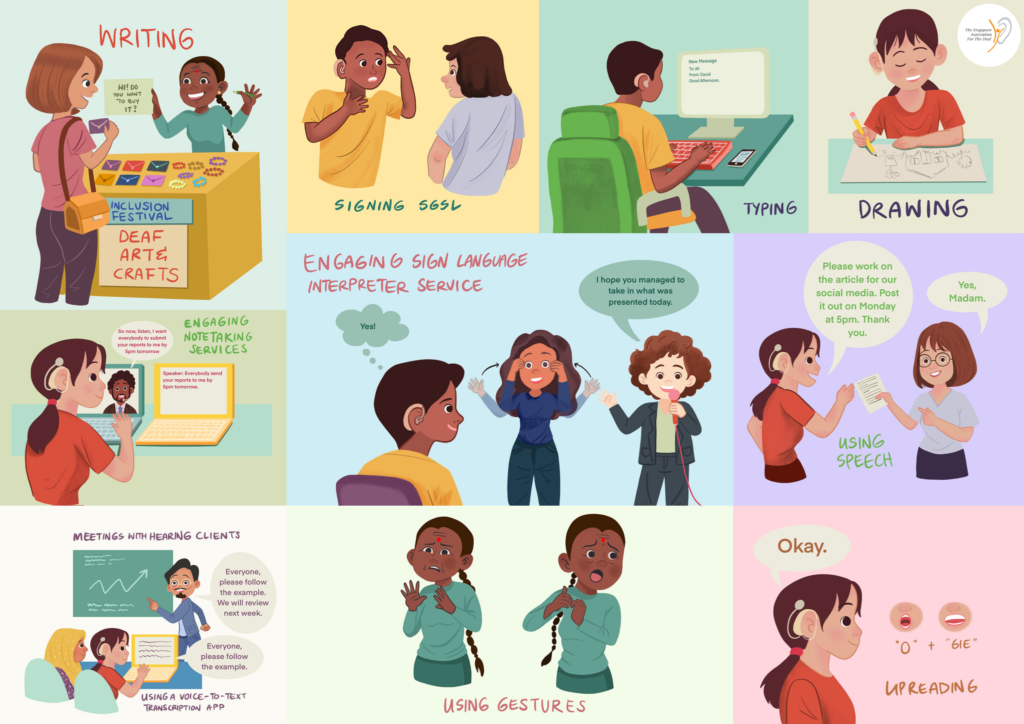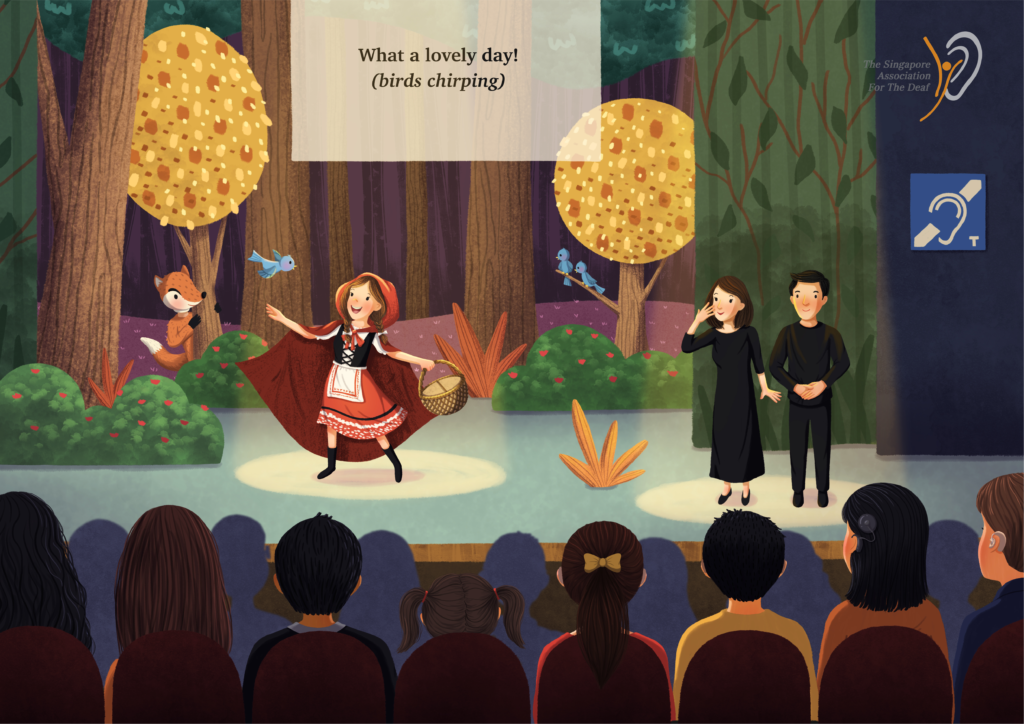Deaf Accessibility in Employment (Communication at Work)

Deaf persons also require jobs and stable income to survive. How can employers communicate smoothly with potential Deaf employees? Here’s a guide to making communication a breeze at the workplace.
-
Appropriate and Inappropriate Terms
Appropriate Terms
✓ Deaf
✓ Hard of hearing
Inappropriate Terms
✗ Hearing Impaired
Often used to refer to people with hearing loss, but note it is viewed negatively by the Deaf community because of its link to medical terminology. The preferred terms are either ‘Deaf’ or ‘hard of hearing’.
✗ Deaf and Dumb
✗ Deaf and Mute
It is best to ask the Deaf or hard-of-hearing individual how he or she prefers to be addressed. The preferred term may vary for each person.
| Note: The opposite of ‘Deaf’ is ‘Hearing.’ Do not refer to hearing people as ‘normal’ because it implies Deaf people are ‘abnormal.’ |
-
Communicating with your Deaf Employee
You wish to hire Deaf employees, but are concerned about possible communication gaps? With the aid of technology and an open mind, there are many ways to communicate with the Deaf and hard of hearing. In fact, some communication methods do not require any additional devices.
- Using Singapore Sign Language (SgSL) 1
- Typing (on a device, texting apps, emails)
- Using a voice-to-text transcription app
- Writing (using pen and paper)
- Engaging sign language interpretation services
- Engaging notetaking services
- Drawing (pictures, diagrams)
- Using gestures (including tracing outlines, acting, pointing)
- Using speech 2 (for those who prefer this method)
- Speechreading 3
Preferred communication methods vary from person to person, and the effectiveness depends on the situation. Be sure to check in with your employee on his / her preferred combination of communication methods in advance.
| 1 On using SgSL: Do consider learning Singapore Sign Language (SgSL) for better and more direct communication with your Deaf employee who uses SgSL. |
| 2 On speech: Some Deaf persons have a fair amount of residual hearing and clear speech. Some may have lost their hearing at a later age (known as late-deafened people); others might have had speech therapy which was effective for them. |
| 3 On speechreading: Also known as lipreading. Some Deaf and hard-of-hearing persons are able to lipread fairly well. However, lipreading is usually difficult and ineffective in many settings. Many words, when produced without its accompanying sound, look similar on the lips. |
-
Communication Accomodations at Work
An employee who is Deaf or hard of hearing might need accommodations at these stages along the employment journey:
1) Interviews (recruitment and exit)
2) Orientation and Induction
3) Delegation of duties
4) Meetings
5) Company events, eg. staff retreats, award ceremonies
8) Trainings and Workshops
Accommodations should be provided by the company. For example, if a sign language interpreter is needed, the company should arrange for it.
It is best to ask the Deaf or hard-of-hearing individual how he or she wishes to communicate and which access options are preferred for work events or functions. There is no one-size-fits-all method as every person has his or her own preferences.
Besides communication access, other factors such as seating arrangements and lighting at the workplace should be raised and discussed with the employee.
| The education profiles, skills and talents, as well as hobbies and interests of Deaf persons vary, as within any community. It would be good to ask and uncover these during the interview (or even during lunch breaks!).
When in doubt, communicate and engage with your Deaf employee directly to ensure communication lines are clear. During work events, ensure that the room is never completely dark at any point in time. |
Fair Employment Practices
Be an inclusive and fair employer by adhering to fair employment practices. Salaries, benefits and opportunities for Deaf or hard-of-hearing employees should be the same as for any other staff doing the same job. Find out more via the Tripartite Alliance for Fair and Progressive Employment Practices (TAFEP) website: https://www.tal.sg/tafep/Employment-Practices
Available Grants for Companies Employing Deaf Staff
The Singapore government also offers grants and schemes to promote the hiring of persons with disabilities.
Find out more: https://www.msf.gov.sg/assistance/Pages/Employment-Assistance-for-Persons-with-Disabilities.aspx
Contact Us For More Information
Deaf employment: https://sadeaf.org.sg/service/cs/or email to cs_enquiry@sadeaf.org.sg
Deaf Awareness Programmes: https://sadeaf.org.sg/deaf-awareness-programme/
Singapore Sign Language courses for organisations: https://sadeaf.org.sg/sgsl-course/
Engaging a sign language interpreter: https://sadeaf.org.sg/service/interpreting/
Engaging a notetaker: https://sadeaf.org.sg/service/notetaking/
Illustration by: Liang Zhi Jie (Isaac), Year 2021.
Commissioned by The Singapore Association for the Deaf.
Copyright owned by: The Singapore Association for the Deaf (2021).
Deaf Dialogue
We have had four Deaf Dialogue sessions so far – in which members of the Deaf and hard-of-hearing community come together to discuss issues pertaining to accessibility, education, employment and healthcare.
Download the Deaf Dialogue 2012 report and the Deaf Dialogue 2021 report.
Mini Enabling Masterplan (For the Deaf)
SADeaf is proud to have participated in the 3rd Enabling Masterplan (2017-2021) and appreciate the acknowledgement in the publication.
Download the full report which includes recommendations and proposed strategies by a 22-member Steering Committee comprising persons with disabilities, caregivers, leaders and professionals in the disability field, voluntary welfare organisations and government agencies.
Singapore Sign Language Bank
An initiative by the Deaf Access Service department which was launched in September 2019, this bank aims to collect signs used by the Deaf community in Singapore, as well as research on and promote Singapore Sign Language to the public.
https://www.sgslsignbank.org.sg/
Engaging Sign Language Interpreters: An e-guide for event organisers
Ever wondered how you can work effectively and smoothly with sign language interpreters for your events, workshops, lectures and other activities? Find out more via our informative guide!
Accessibility Needs For a Deaf-Friendly Show
For the Deaf and Hard-of-Hearing community, the theatre experience is not the same as it is for hearing audience. Theatre companies can improve make their performances accessible to Deaf and Hard-of-Hearing audiences by following these guidelines.
Read More here.
